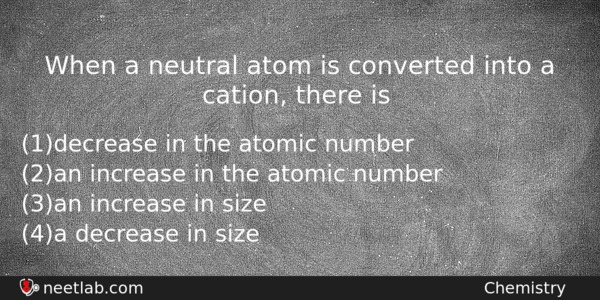| ⇦ | 
| ⇨ |
When a neutral atom is converted into a cation, there is
Options
(a) decrease in the atomic number
(b) an increase in the atomic number
(c) an increase in size
(d) a decrease in size
Correct Answer:
a decrease in size
Explanation:
During the conversion of a oneoutral atom into a cation, size decreases because after removal of one or more electron
(i) Nuclear charge per electron increases.
(ii) Outermost shell is completely removed.
Related Questions: - Which one of the following has the highest molar conductivity
- The bond angle in water is
- The letter ‘D’ in D-glucose signifies
- For the cell reactionCu²⁺ (C₁.aq) + Zn(s) = Zn²⁺(C₂.aq ) + Cu(s)
- Which of the following compounds shows evidence of the strongest hydrogen bond
Question Type: Memory
(964)
Difficulty Level: Easy
(1008)
Topics: Classification of Elements and Periodicity
(94)
Subject: Chemistry
(2512)
Important MCQs Based on Medical Entrance Examinations To Improve Your NEET Score
- Which one of the following has the highest molar conductivity
- The bond angle in water is
- The letter ‘D’ in D-glucose signifies
- For the cell reactionCu²⁺ (C₁.aq) + Zn(s) = Zn²⁺(C₂.aq ) + Cu(s)
- Which of the following compounds shows evidence of the strongest hydrogen bond
Question Type: Memory (964)
Difficulty Level: Easy (1008)
Topics: Classification of Elements and Periodicity (94)
Subject: Chemistry (2512)
Important MCQs Based on Medical Entrance Examinations To Improve Your NEET Score
18000+ students are using NEETLab to improve their score. What about you?
Solve Previous Year MCQs, Mock Tests, Topicwise Practice Tests, Identify Weak Topics, Formula Flash cards and much more is available in NEETLab Android App to improve your NEET score.
Share this page with your friends

Leave a Reply